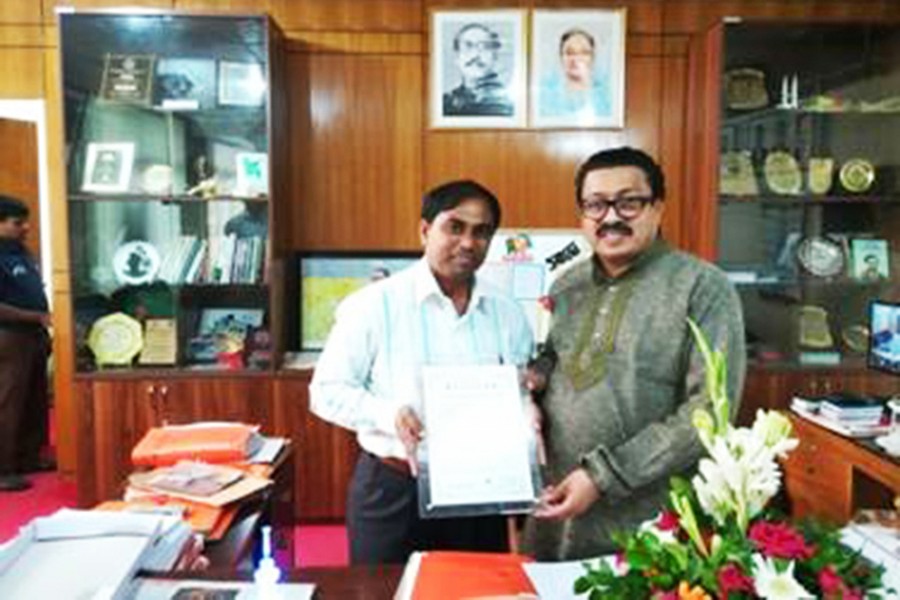
Published :
Updated :

Research is an important part of science departments of world's prominent universities. Unfortunately in Bangladesh teachers of local varsities seldom engage them in research works for lack of adequate funds and patronisation. Despite the limitations some enthusiastic teachers involve themselves in research activities.
Such an enthusiastic teacher is Dr Subodh Kumar Sarkar. He is Associate Professor and Chairman of the Department of Biochemistry and Molecular Biology of the Noakhali Science and Technology University.
Dr. Subodh Kumar has developed three types of black garlic, namely NSTU- BG- 1 (DL- BG); NSTU- BG-2 ( DS-BG) and NSTU- BG-3 (CL- BG), the first of its kind in Bangladesh, in cooperation with Dr Jin Ichi Sasaki, former professor of Hirosaki University of Health Sciences, Japan.
In this research it has been proved all the three black garlic varieties developed by Dr Subodh contains enough flavonoids, alkaloids, saponin, tannin, cardiac glycosides and lower sugar. The experimental results of the extracts of both NSTU- BG-1 (DL-BG) and NSTU-BG-2 (DS- BG) showed strong antibacterial activity against bacteria other than NSTU- BG -3 (CL- BG).
The results of antibacterial activity and phytochemical screening indicates the presence of potent bioactive compound in both of the black garlic varieties , NSTU- BG- 1 (DL- BG) and NSTU- BG -2 ( DS- BG) like the Japanese variety of black garlic (JL- BG) which might be useful as a medicinal supplement to control pathogenic bacterial infections, especially caused by Gram-positive bacteria.
The experimental results also show that the NSTU- BG- 1 (DL- BG) and NSTU- BG- 2 ( DS -BG) varieties of black garlic are of high quality other than NSTU- BG- 3 (CL- BG), Chinese Large (CL-BG) and Japanese Large (JL-BG) black garlic.
Garlic (Allium sativum L.) has been being used as foods and spices in many countries for thousands of years and has been used worldwide as a traditional medicine for over 4000 years to treat several health disorders.
Microbiologist Louis Pasteur also demonstrated the bactericidal properties of garlic and later it was called "Russian penicillin" in the Second World War.
Black garlic cultivation was started in Japan, Korea, the USA, Australia, the Philippines and some other countries in recent years. The estimated market value of black garlic is approximately 94 million US dollars only in Korea as well as in America.
It became the trigger to establish the black garlic companies in Japan by involving Korea, China, Australia, and the UK, the Philippine and other countries.
Even though Japan, Korea, USA, Australia, the Philippines and other countries have been developing black garlic due to its medicinal and economic value, it has not yet been that much in Bangladesh and even not included in the food lists here due to lack of both publicity and sufficient researches in this area.
Dr Subodh carried out this research in collaboration with Professor Dr. Jin Ichi Sasaki, former professor of Hirosaki University of Health Sciences, Japan, and Professor Chowdhury Rafiqul Ahsan, Professor of the Department of Microbiology, University of Dhaka, Bangladesh.
Dr Shirley Castaneda Arrupis, President of Mariano Marcos State University, Philippines, Professor Hirose Shigehisa, Institute Professor and Former Dean, Faculty of Bioscience and Biotechnology, Tokyo Institute of Technology, Japan, and Dr Tatsuro Miyaji, Associate Professor, Department of Materials and Life Science, Faculty of Science and Technology, Shizuoka Institute of Science and Technology, Japan are also interested to work jointly in this project.
For the Black Garlic research in Bangladesh, Dr Subodh received an award as the "Black Garlic Ambassador" in the Third International Black Garlic Summit in Hachinohe, Japan on September 06, 2018 from Shinichi Kashiwazaki, President of Black Garlic International Conference & Aomori Black Garlic Association, Japan.
Dr Subodh could succeed in his research due to the help, encouragement and all types of cooperation from Professor Jin Ichi Sasaki, Former Professor of Hirosaki University of Health Sciences, Japan and Professor M Wahiduzzaman, VC of Noakhali Science and Technology University.
The findings of this research on development of three varieties of black garlic were presented in two international conferences namely Fourth AFSA International Conference on Food Safety and Food Security, 2018 in Cambodia on August 11, 2018 and the Third International Black Garlic Summit in Hachinohe, Japan on September 06, 2018 respectively.
Dr Subodh thinks that if the government provides financial support and all kinds of help on Black Garlic research, it will be possible to produce the spice item on a large scale in the country.
Dr Subodh obtained MSc and M Phil degrees from the University of Rajshahi. He hails from Tanoir upazila of Rajshahi district. He is the eldest of the four children of his father Surendranath Sarkar.
If black garlic is cultivated properly in our country, it will bring more foreign currencies and farmers will be benefited very much as they will get good prices for their produce.
Iftekhar Hossain is the public relations officer at Noakhali Science and Technology University


 For all latest news, follow The Financial Express Google News channel.
For all latest news, follow The Financial Express Google News channel.